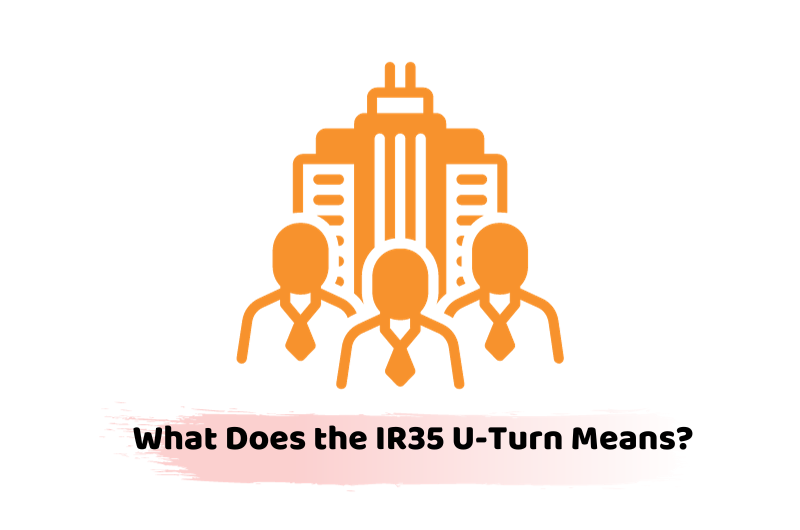In this discussion, we will talk about what the IR35 U-turn means. The term “IR35 U-turn” refers to a change in government policy regarding the implementation of the off-payroll working rules (IR35). The delay is often referred to as an “IR35 U-turn” because it represents a reversal of the original plan. It gives businesses and contractors more time to prepare and adjust to the new rules.
Get in touch with one of our experts to learn more about ir35 u-turn means. We are available from 9:00 am – 05:30 pm Monday to Friday.
What Does the IR35 U-Turn Mean?
The IR35 U-turn refers to a significant change in the implementation of the IR35 legislation in the United Kingdom. However, with the U-turn, the responsibility shifted to the clients or employers. This change has had a significant impact on the way businesses engage with contractors and has caused a lot of discussion and debate within the industry.
It aims to ensure that contractors are properly classified for tax purposes and that the correct employment taxes are paid. The U-turn has brought about a shift in accountability and has prompted businesses to review their contractor engagement practices to comply with the new regulations.
How is IR35 Changing in 2023?
The IR35 legislation is set to undergo some significant changes started from April 6, 2023. These changes aim to ensure fair taxation and prevent the misclassification of workers. Businesses need to prepare for these changes by reviewing their contractor engagements and ensuring they have the necessary processes in place to comply with the new regulations. It’s a big shift, but with careful planning and understanding, businesses can navigate these changes smoothly.
What are the Tips for Contracting Outside of IR35?
First and foremost, it’s important to ensure that your contract and working arrangements reflect a genuine self-employed relationship. This means having control over how, when, and where you work, as well as the ability to provide substitutes if needed.
It’s also crucial to maintain a level of independence from the client, showing that you are not integrated into their organisation as an employee. Keeping detailed records of your work, including invoices and contracts, can also help demonstrate your self-employed status. Lastly, it’s a good idea to stay up to date with the latest IR35 legislation and seek professional advice if needed.
Will Off-Payroll Working Rules Remain in Place in the Public and Private Sectors?
The off-payroll working rules, also known as IR35, continue to apply in both the public and private sectors. These rules are designed to ensure that individuals working through an intermediary, such as a limited company, pay the appropriate employment taxes.
Similarly, started from April 6, 2023, in the private sector, medium and large businesses will also assume this responsibility. Contractors and businesses must understand and comply with these rules to avoid any potential tax liabilities.
Was This the Right Decision?
It’s a matter of opinion, but the government’s decision to implement and enforce the off-payroll working rules (IR35) in both the public and private sectors has been met with mixed reactions. Some argue that it helps ensure fair taxation and prevents the misclassification of workers, promoting a level playing field.
Others, however, express concerns about the potential impact on the flexibility and competitiveness of the contractor market. Ultimately, the government intends to address tax avoidance and ensure that individuals are paying the correct employment taxes. The effectiveness and impact of this decision will continue to be debated among various stakeholders.
What Should Businesses Do?
Now that the off-payroll working rules (IR35) are in place, businesses should take proactive steps to ensure compliance. First, it’s important to review and assess the employment status of contractors to determine if they fall inside or outside IR35. This can be done by conducting thorough assessments of the working arrangements and contracts.
If contractors are deemed to be inside IR35, businesses should make the necessary tax deductions and ensure proper reporting. It’s also crucial to communicate and collaborate with contractors to ensure they understand the changes and their responsibilities. Seeking professional advice from accountants or tax experts can provide valuable guidance in navigating these rules. By taking these proactive measures, businesses can mitigate risks and ensure compliance with IR35.
The Bottom line
In conclusion, businesses need to adapt and comply with the off-payroll working rules IR35 to avoid any potential tax liabilities. By reviewing the employment status of contractors, making accurate tax deductions, and maintaining clear communication, businesses can navigate these rules effectively. Seeking professional advice from accountants or tax experts can provide valuable support in ensuring compliance. Ultimately, staying informed and proactive in implementing the necessary measures will help businesses mitigate risks and maintain a smooth operation within the IR35 framework.
Reach out to our expert professionals to get your queries answered instantly. We will love to come up with the best possible solutions to your queries ir35 u-turn means.
Disclaimer: The information about ir35 u-turn means is provided in this article including text and graphics. It does not intend to disregard any of the professional advice.





















































